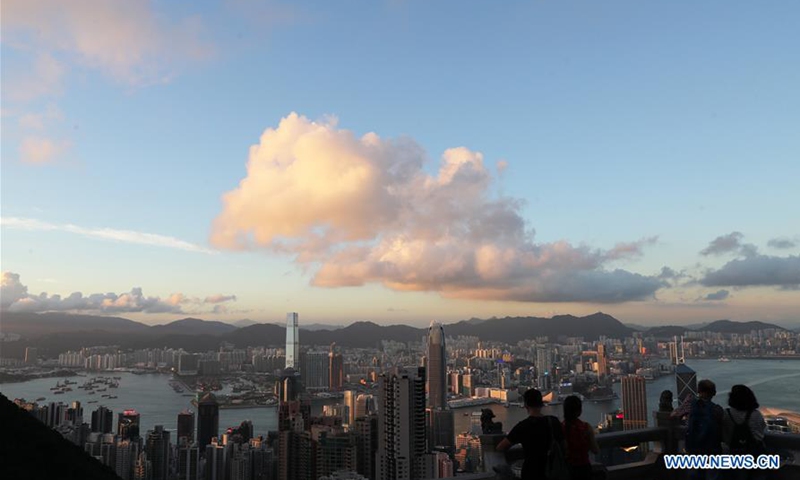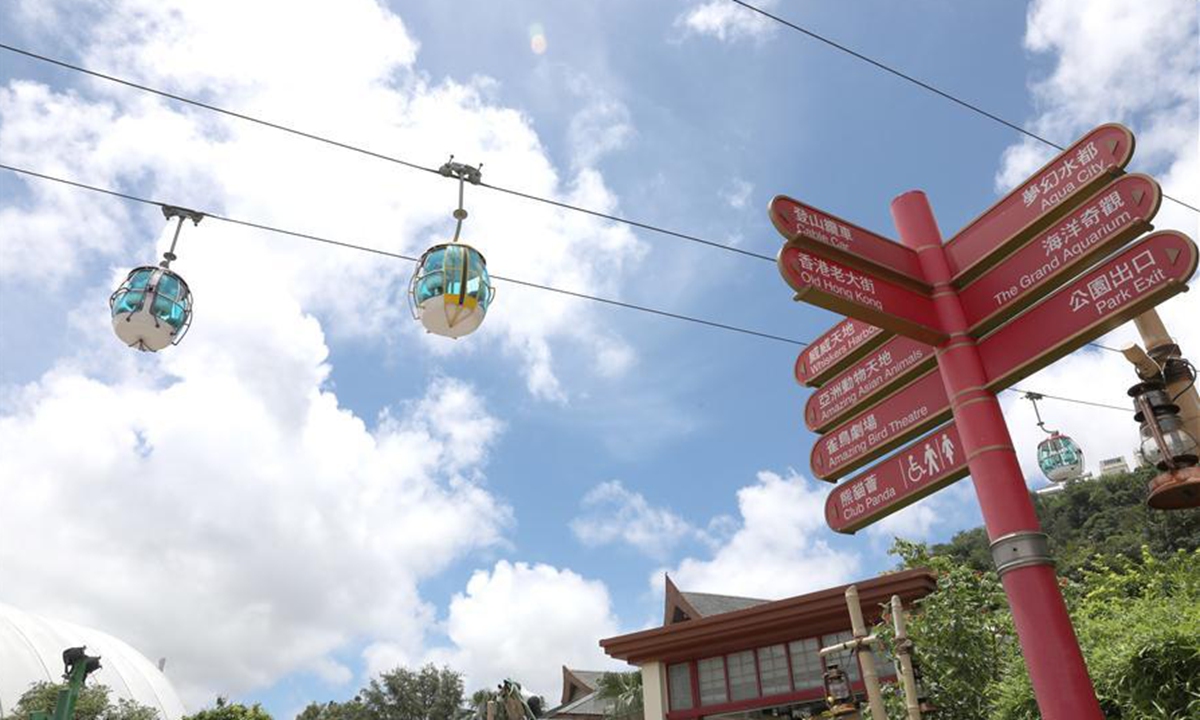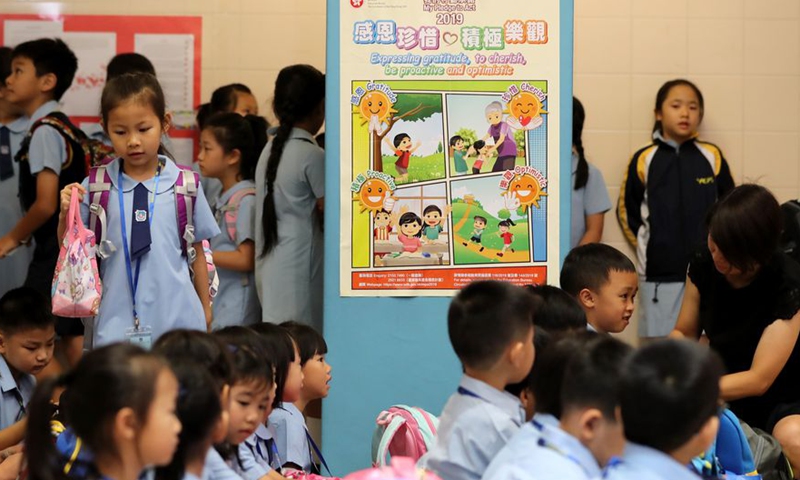China’s top legislature likely to enact national security law for HK at next session by July 1
Bill mirrors maximum trust of central govt in SAR: observer

People view the scenery in Hong Kong, south China, June 11, 2020. Hong Kong's unemployment rate increased to 5.9 percent in the period from March to May 2020, surpassing the peak in the aftermath of the 2008 global financial crisis and hitting a record high in more than 15 years, the Hong Kong Special Administrative Region (HKSAR) government said on Tuesday. (Xinhua/Li Gang)
Hours after China revealed the details of the draft of the national security law for Hong Kong, the country's top legislature set the date for the next session of the National People's Congress Standing Committee, during which the highly anticipated law is likely to be enacted to end the chaos and rampage throughout the city that has become "a base of subversive activities" instigated by the West over the years.
The Standing Committee of the 13th National People's Congress (NPC), China's top legislature, will convene its 20th session from June 28 to 30 in Beijing, according to a chairpersons' meeting held on Saturday, chaired by Li Zhanshu, chairman of the NPC Standing Committee.
Though the national security law for Hong Kong was not on the official agenda when the NPC Standing Committee announced it for the upcoming session, observers said that the draft could be proposed by the chairman of the NPC Standing Committee during the session.
Tam Yiu-chung, a member of the NPC Standing Committee from Hong Kong told the Global Times on Sunday that it is expected that top lawmakers may vote on the law during the committee's upcoming session before July 1.
According to a statement released after the three-day meeting of the 19th session of the 13th NPC Standing Committee which concluded on Saturday, the central government would set up a commissioner's office for national security affairs in the Hong Kong Special Administrative Region (HKSAR) and the HKSAR should establish a commission of safeguarding national security. By proposing to set up the two agencies, the law would mirror "the maximum trust" granted by the central government to the HKSAR government and give "maximum protection" to Hong Kong people's human rights and the rule of law, observers said. It also takes into account both Hong Kong's common laws while ensuring the law is implemented in the most effective way, they noted.
However, some Western media outlets, local opposition groups in Hong Kong and secessionists such as Jimmy Lai and Joshua Wong have not given up on smearing the legislature, calling it "controversial" and claiming that it would profoundly change the way Hong Kong people live and end the so-called political freedoms enshrined under "one country, two systems."
"Like I expected a few days ago, some lawmakers from opposition groups and others rushed to take their consistent tactics by spreading frightening rumors, smearing and demonizing the draft in order to attack the central and HKSAR governments," Carrie Lam, chief executive of the HKSAR government, said in a post published on her Facebook page after the details of the draft law were released.
Attempts at smearing the law or seeking help from foreign countries or associations to interfere in the matter are doomed to fail, as the determination of the central government to push forward the law and safeguard national security will not be shaken, Lam noted.
Still, when Western media, politicians and some NGOs depict the draft law on national security for Hong Kong, some characterizations have been filled with misinterpretation, prejudices and unfounded claims that question not only the high degree of autonomy enjoyed by the HKSAR but also the future of "one country, two systems." Some have not even taken a look at what the provisions of the draft law are really about, which has drawn a clear line between responsibilities and power of the central authorities and HKSAR.

Photo taken on June 13, 2020 shows the cable cars in the Ocean Park in Hong Kong, south China. Hong Kong's iconic theme park Ocean Park resumed operations on Saturday after being temporarily closed for more than four months due to the COVID-19 epidemic. To ensure the health and safety of visitors, employees and animals, the maximum instantaneous in-park capacity will be reduced to 9,000 people, 25 percent of the usual level, in the first two weeks following the reopening. (Xinhua/Wu Xiaochu)
A real threat?
Some US media such as The New York Times said the upcoming law would "punch a hole" in Hong Kong's judicial system, citing "pro-democracy" politicians while the Wall Street Journal, citing opposition groups and foreign governments including the US, criticized the move as compromising the high degree of autonomy enjoyed by the city. Other media like Reuters said the HKSAR's freedoms are in doubt, citing critics, and said the law signals "the deepest change to the city's way of life" since the city returned to the motherland in 1997.
After some observers in Hong Kong and the mainland carefully went through details in the draft law, they came up with the same conclusion: the draft is conveying the message from the central government to respect law enforcement and judiciary systems in the HKSAR on national security matters. "Only when HKSAR authorities can't handle a very few cases will the central government step in and exercise jurisdiction," Tam said.
The details of the draft law indicated that the central government would establish a commissioner's office for national security affairs to assess national security situations in the city and make recommendations on key strategies as well as major policies in maintaining national security. It will also oversee, guide, coordinate and support the HKSAR to fulfill its duty to protect national security, collect intelligence and handle criminal cases concerning national security in accordance with the law.
"It's necessary to set up a commissioner's office in Hong Kong to share intelligence, pass on experiences, provide technical support and help work arrangements on national security matters. It will support the HKSAR in implementing the national security law in a fully fledged, effective and accurate manner," said Lau Siu-kai, vice-president of the Chinese Association of Hong Kong and Macao Studies.
The threat to national security posed by some forces in Hong Kong has become very serious, and the HKSAR has even become an "intelligence base, infiltration base and subversive base" for different countries, especially for the West, observers said.
The social turmoil over the past year showed that the HKSAR lacks sufficient capability and experience to safeguard national security due to the absence of an effective legal and law enforcement mechanism, as a result, guidance and supervision from the commissioner's office for national security affairs is urgently needed, which would closely coordinate with HKSAR authorities, Lau told the Global Times.
The new central government office will not interfere with Hong Kong Police Force (HKPF) operations, as there will be a clear division of rank and work, where the commissioner's office will handle complex national security cases that cannot be handled by the police force, observers said, giving further explanation about why it is not a move to undermine "one country, two systems."
The office's relationship with the Hong Kong police is akin to that of the US Federal Bureau of Investigation with local police and that of the UK's MI5 Security Service with local police, Lawrence Tang Fei, a member of the Chinese Association of Hong Kong and Macao Studies, told the Global Times.
"For instance, in the US, the FBI works at federal government level while each state and city has their own police force. When it comes to major cases that can't be handled by single state, they require the deployment of the FBI," he said.
Specifically, the commissioner's office for national security affairs will handle cases that involve cross-border crimes that are beyond Hong Kong's jurisdiction and involve foreign diplomats who enjoy diplomatic immunity. "These cases are very hard for [local police and judiciary system] to handle and the central government must step in," Tang said.

Children attend an event marking the new semester at Yaumati Catholic Primary School in south China's Hong Kong, Sept. 2, 2019.Photo:Xinhua
Judicial independence ensured
Under the draft law, the HKSAR government will set up a special commission chaired by the chief executive to protect national security. It also allows the chief executive to appoint judges to handle national security cases. Critics raised concerns that the independence of the city's judiciary system will be jeopardized.
However, the draft law clearly states that the HKSAR shall exercise jurisdiction over criminal cases that endanger national security, from the investigation phase, to prosecution and trial and punishment, unless there are special circumstances.
"The draft showed that it will thoroughly activate and use the existing forces within the HKSAR government to execute the law-enforcement missions regarding national security affairs," Tian Feilong, a Hong Kong affairs and legal expert at Beihang University in Beijing, told the Global Times.
According to the content of the draft law, the jurisdiction power could be divided into "jurisdiction over normal and special cases," Tian said.
The national security commission in Hong Kong, led by chief executive, incorporating nine departments such as Chief Secretary for Administration, Director of the Chief Executive's Office, Financial Secretary, Secretary for Justice, Secretary for Security, Commissioner of Police, head of national security department of the HKPF and Director of Immigration Department will be in charge of the normal cases, the expert noted.
Once the case goes beyond the law-enforcement capability of HKSAR authorities, for example if it brings huge impact to public order and the legal system of the city, or HKSAR agencies face unprecedented pressure and difficulties with intelligence collection, case investigation and judgment, central authorities must step in to take ultimate responsibility, Tian said.
"The turmoil that started in June 2019 against the extradition bill fits the standard of the special situation," he said.
A growing number of legal experts and observers have been discussing whether cases related to the riots triggered by the now-withdrawn extradition bill since last year should be handled by the HKSAR or the central government, Tian said.
The cases relevant to the riots go beyond the capabilities of local law enforcement agencies, which had a huge impact on the rule of law and social order in Hong Kong, the expert noted. "The new law could apply retroactively to these cases, as the riots are not a past event but still ongoing," Tian added.
When it comes to the appointment of judges, some are concerned that Hong Kong will not be ruled by law, but by people. Senior Counsel Ronny Tong Ka-wah rebutted the claim.
"It's indeed strange to say appointing judges would harm the rule of law, as the Basic Law already states that judges of the courts of the HKSAR shall be appointed by the chief executive," he said.
Tong noted that while he previously did have some concerns over the upcoming law, which he feared might harm the city's judicial independence; he was reassured after he read the details of the draft law.
"Especially after I read the relevant articles about Hong Kong residents' rights according to the Basic Law of the HKSAR, International Covenant on Civil and Political Rights and International Covenant on Economic, Social and Cultural Rights," he said.
Accelerate at full speed
While some countries like the US and UK continue to criticize China over the upcoming national security law for Hong Kong, lawmakers and observers said the external pressure will not have any impact on the central government's political will and legislature agenda on handling domestic affairs, particularly when they touch the country's core interests and the bottom-line.
"The decision made by the NPC on May 28 clearly stated the necessity and urgency of formulating the law. The NPC standing committee has the constitutional responsibility to accelerate the law's formulation to implement that decision," Tian said, noting that local and external forces inside and outside Hong Kong have been stepping up efforts to undermine the legislative process, which would instead help accelerate this process.
Meanwhile, the G7 statement on Hong Kong has exposed the severity of foreign intervention, and accelerating the legislative process of the law at full speed would demonstrate the central government's strong will and determination to strike down foreign interference and protect national security, he said.
Newspaper headline: National security law for HK ‘likely to be enacted by July 1’